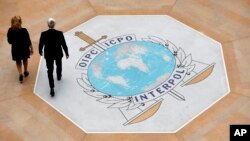Interpol is the world’s largest global police organization, consisting of 194 member countries.
The group was officially created in 1923 as the International Criminal Police Commission, but became known as Interpol in 1956.
The idea for the organization was broached in 1914 at the first International Criminal Police Congress in Monaco. Law enforcement officials from 24 countries met there to discuss policing procedures and techniques and centralized international criminal records.
The organization says it has developed high-tech infrastructure to help “meet the growing challenges of fighting crime in the 21st century.”
Red Notices
One such tool at Interpol’s disposal is the Red Notice, a request to “locate and provisionally arrest an individual pending extradition.”
Red Notices, which alert police departments around the world, are issued by the General Secretariat on behalf of a member country or an international tribunal.
The notices raise the visibility of cases, allowing law enforcement authorities to identify criminals and suspects and share information.
For example, a country searching for a terrorist or other criminal outside its borders can issue a notice to alert police in other countries and seek arrests.
The secretary-general, currently German police official Juergen Stock, runs Interpol’s operations.
The group also has a president who is not as directly involved in operations, instead devoting much of his time to general oversight and presiding over the group’s general assembly and executive committee.
New chief
Member nations elected South Korea’s Kim Jong Yang as Interpol’s new president on Wednesday. He defeated Russia’s Alexander Prokopchuk amid U.S.-led warnings the Kremlin would try to leverage the position to hunt down political opponents and fugitive dissidents.
Interpol's charter says the organization cannot be used for political reasons.






